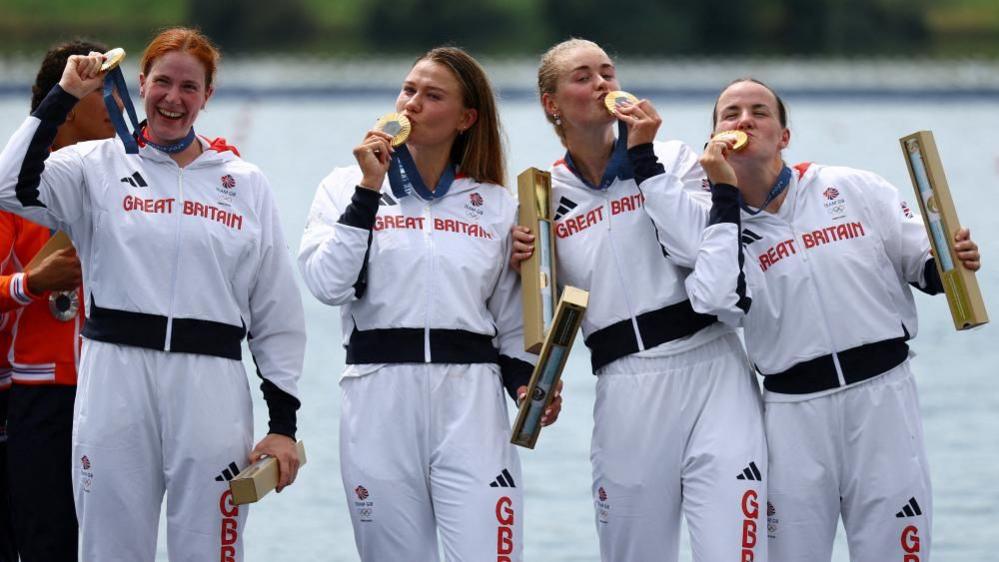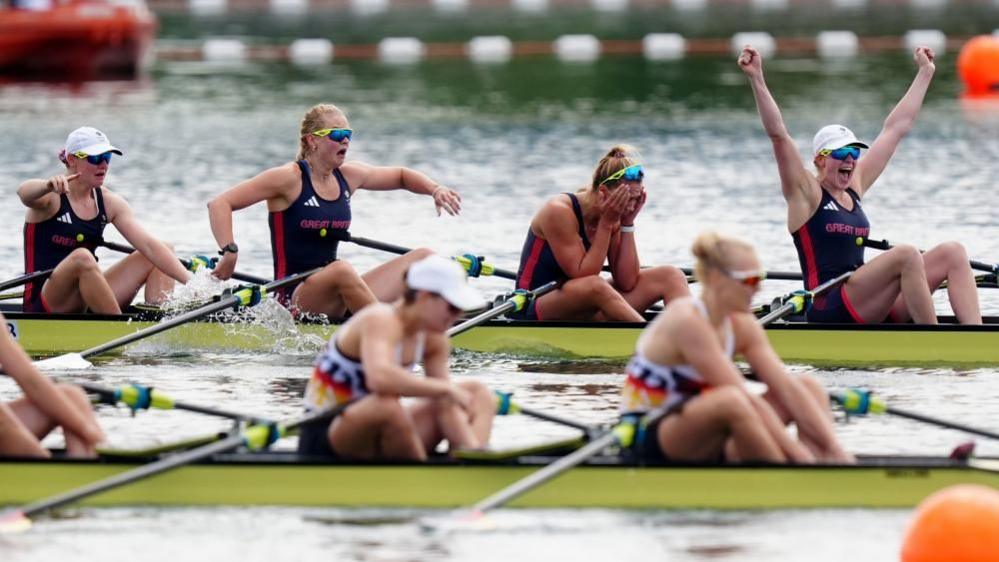Lola Anderson's dad kept her diary dream alive

Lola Anderson, second from the left, dreamed of being an Olympic champion as a teenager
- Published
If you had told 14-year-old Lola Anderson that one day she would be an Olympic champion, she would not have believed you.
Twelve years ago, the teenager watched rowers Helen Glover and Heather Stanning win gold at London 2012. Overcome by a “huge wave of inspiration”, she now says, she pulled out her mini Jack Wills diary and wrote in pink highlighter:
"My name is Lola Anderson and I think it would be my biggest dream in life to go to the Olympics in rowing and if possible win a gold for GB."
Immediately, Anderson says, she was so embarrassed by it that she ripped it out and threw it in the bin.
“I thought ‘that’s just so embarrassing, Lola, you’re never going to do that’,” she recounted on BBC Radio 4’s Today programme.
Her father Don Anderson, a rower himself, found the note shortly afterwards while emptying her bin and pocketed it.
Seven years later, he handed the note back to her.
He had been diagnosed with terminal cancer and wanted her to have it “as a reminder and a memento that even when you don't back yourself, your parents and loved ones always do", Anderson recounted.
Don Anderson died two months later.
It was that treasured note which inspired Anderson to follow her teenage dream all the way to Paris 2024, where she and her team won gold in the women's quad sculls on Wednesday.
“I know that he’d be so, so proud,” she said about her dad during a tearful interview with the BBC. “I’m thinking a lot about him right now.”
Emotional Anderson and Scott interview after winning gold
Anderson said she is really sorry to anyone who, like her mother and siblings, might have had a “minor heart attack” as Team GB crossed the finish line ahead of the Netherlands by a hair to take gold.
Entering the final 500m, the Netherlands had a half-a-boat length’s lead ahead of GB and were rocketing towards the finish line.
Team GB matched their pace and it seemed the country would be celebrating a silver medal achievement.
That is until the final metres, so close to the finish line that the broadcasts had stopped measuring distance, that Anderson, along with teammates Hannah Scott, Lauren Henry and Georgie Brayshaw, nudged ahead at the final stroke.
Spectators and commentators were left to wonder whether Team GB had clinched the win, as the result was too close for officials to immediately call, but Anderson knew they had done it.
“When I heard Lauren scream, it sounded like a happy scream and not a gutted sort of crying tears,” she said.
“And that’s when I started to realise what had happened.”

Left to right: Lauren Henry, Hannah Scott, Lola Anderson and Georgie Brayshaw celebrate their win
It was a moment laden with emotion, one that Anderson described as “bittersweet, but mostly sweet”.
“There’s the emotional side of ‘I wish [Dad] was here to see that, then the gratitude of ‘I have all of my other family around with me still',” Anderson said.
“My mum and my siblings were just screaming their heads off.”
Thinking back to that 14-year-old who was so overcome with Olympic dreams, Anderson said she would not recognise herself now.
As a young girl she said she struggled to see a place for herself in sport, “just because often female athletes can struggle to feel like they keep their femininity”.
But she said she has noticed that change recently.
“It’s just a whole, brand new world now where women are able to go out and say ‘no I want to be as strong as possible and that doesn't change anything about me’,” Anderson said.
“Participating in sport has made me a much stronger version of myself, not just physically obviously, but in terms of what I can set my mind to do and what I feel like I am able to achieve."
